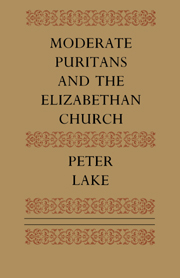Book contents
- Frontmatter
- Contents
- Dedication
- Preface
- 1 Introduction: Laurence Chaderton and the problem of puritanism
- 2 Moderate beginnings: the case of Edward Dering
- 3 Chaderton's puritanism
- 4 The moderate puritan divine as anti-papal polemicist
- 5 Thomas Cartwright: the search for the centre and the threat of separation
- 6 William Whitaker's position as refracted through his anti-papal polemic
- 7 Theory into practice: puritan practical divinity in the 1580s and 1590s
- 8 William Whitaker at St John's: the puritan scholar as administrator
- 9 The theological disputes of the 1590s
- 10 Conformity: Chaderton's response to the Hampton Court Conference
- 11 William Bradshaw: moderation in extremity
- 12 Conclusion
- Notes
- Bibliography
- Index
11 - William Bradshaw: moderation in extremity
Published online by Cambridge University Press: 16 October 2009
- Frontmatter
- Contents
- Dedication
- Preface
- 1 Introduction: Laurence Chaderton and the problem of puritanism
- 2 Moderate beginnings: the case of Edward Dering
- 3 Chaderton's puritanism
- 4 The moderate puritan divine as anti-papal polemicist
- 5 Thomas Cartwright: the search for the centre and the threat of separation
- 6 William Whitaker's position as refracted through his anti-papal polemic
- 7 Theory into practice: puritan practical divinity in the 1580s and 1590s
- 8 William Whitaker at St John's: the puritan scholar as administrator
- 9 The theological disputes of the 1590s
- 10 Conformity: Chaderton's response to the Hampton Court Conference
- 11 William Bradshaw: moderation in extremity
- 12 Conclusion
- Notes
- Bibliography
- Index
Summary
At first sight Bradshaw's opinions might appear to be so radical as to deny him a place in any study of supposedly moderate puritan opinion. However Bradshaw is important for the present study for three reasons. Firstly, having examined the moderate response to Hampton Court, it might prove instructive to compare that with the response of more radical spirits and Bradshaw provides just such an example. Secondly, given his status as one of Chaderton's protégés, he also provides a striking example of Chaderton's continuing links with men whose opinions were considerably more radical than his own. Thirdly, moreover, his views, on closer examination, appear to have been subject to precisely the same sorts of constraint as had earlier checked the radical overtones of Chaderton's presbyterianism. Hence Bradshaw's career and opinions provide an interesting case-study of the logic of the moderate puritan situation in a period when presbyterianism and the movement that sustained it were no longer a living force.
We last encountered Bradshaw having been deprived of his living in Kent. Thence he returned to his native Leicestershire, where by the good offices of Arthur Hildersham he gained a post in the household of ‘a religious gentleman’ by the name of Alexander Redich. Bishop Overton of Coventry and Lichfield was, to quote Gataker, ‘a moderate man’, and he gave Bradshaw a licence to preach twice every Sunday in a chapel of ‘some capacity’ on the Redich estate.
- Type
- Chapter
- Information
- Moderate Puritans and the Elizabethan Church , pp. 262 - 278Publisher: Cambridge University PressPrint publication year: 1982
- 1
- Cited by



